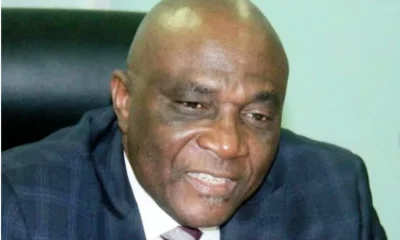News
Tinubu Moves To Clear $10bn Forex Backlog

President Bola Tinubu has promised to honour all the foreign exchange obligations that Nigeria has entered into through forward contracts.
Forward contracts are financial agreements where two parties agree to exchange a specified amount of one currency for another currency at a predetermined future date and exchange rate.
The Central Bank of Nigeria (CBN) initiated agreements with Nigerian businesses to sell forward contracts, which essentially promised the businesses a fixed amount of dollars at a predetermined price in the future. These contracts allowed the businesses to open Letters of Credit (LCs), which are a form of payment guarantee issued by banks on behalf of the importers.
With the assurance of receiving the promised dollars from the CBN, the businesses utilized these LCs to import goods from foreign suppliers. The expectation was that when the goods arrived, the CBN would release the dollars to the importers, allowing them to fulfill their payment obligations to the suppliers. This system ensured a smooth flow of imports and facilitated international trade for Nigerian businesses.
However, since February 2023, the CBN has been unable to fulfill its promises and has not provided the businesses with the dollars they were allocated under the forward contracts. As a result, there is now a significant backlog of approximately $3 billion owed to these businesses. This means that the businesses are unable to fulfil their obligations to their foreign suppliers, leading to disruption in the supply chain and potentially damaging their relationships with international partners.
The consequences of the CBN’s failure to meet its commitments are not limited to domestic businesses alone. Foreign investors also have a substantial backlog of approximately $10 billion owed to them by the CBN. This impacts the confidence and trust of foreign investors in the Nigerian economy, potentially deterring future investments and harming economic growth.
Moreover, the shortage of foreign exchange liquidity resulting from this failure has forced the CBN to suspend various transactions. These include payments for school fees and Personal Travel Allowance (PTA) applications, causing inconvenience and financial difficulties for individuals who rely on these services.
Overall, the CBN’s failure to fulfil its promises has had significant financial consequences for the businesses involved, leading to a backlog of owed payments and disruptions in international trade relationships. This has also negatively impacted the broader economy’s stability, with suspended transactions and a potential decrease in foreign investor confidence. Resolving this issue and restoring trust in the CBN’s ability to honour its commitments will be crucial for the recovery and growth of the Nigerian economy.
To address this huge Forex backlog, President Bola Tinubu at the 29th edition of the Nigeria Economic Summit Group (NESG) announced that “consistent with our commitment to enshrining fairness and the rule of law in our country, this government will uphold the sanctity of every legitimate contract.
He said: “Specifically, as it relates to foreign exchange obligations of the government, all forward contracts that the government has entered will be honoured and a framework has been put in place to ensure that these obligations are met in due course.”
Tinubu also disclosed that a framework has been established to ensure that the government meets its foreign exchange obligations as stipulated in the contracts.
An official of the Central Bank of Nigeria (CBN) who was at the event said, “This framework will likely include policies, procedures, and financial resources to ensure the obligations are met as agreed upon.”
The president in his address to the NESG, said there must be consumer credit, adding that the scheme would have to come to effect as soon as possible.
He said: “I task my team and my colleagues to build this programme and develop it now. We cannot talk about anti-corruption when you have to look for cash to buy a car when there’s no mortgage for homeownership.
“Where do you expect a civil servant to have N3 million or N5 million for housing without corruption? If you don’t change and plan the welfare of your judiciary and you ask them to be fair, render justice with mercy, with a hungry stomach.
Tinubu noted that Nigeria aims to achieve a $1 trillion economy by 2026 and $3 trillion within this decade through sustainable and competitive growth.
He said the private sector is crucial to achieving this goal, and that the government is seeking collaboration and support from industry leaders to realize this vision.
He said public-private partnerships and successful models from the past will be utilized to ensure a prosperous Nigeria for all.
Tinubu said: “The private sector is encouraged to bring their ideas, leadership, and capital to build a hopeful future. I am confident that by working closely with all of you in the private sector, financing our $3 trillion National Infrastructure Stock can be achieved in 10 years and not in 300 years.
“Building megacities in every geopolitical zone of the size and scale of Lagos must not take us another six decades. We can do it in one decade. A fully networked and connected Nigeria by rail, gas, fibre optics and road network can be constructed in less than 20 years. Establishing thriving Industrial zones in every part of Nigeria is possible before 2030.”
Speaking about the need to stimulate the economy, President Bola Ahmed Tinubu disclosed that “by January 2024, the new student loan programme and consumer credit schemes will have come into effect. New and affordable homes will also be built at a record pace. We have all felt the pain of these reforms; soon, we shall begin to reap the rewards. It is my hope that this Summit will deliberate and proffer yet more solutions to complement the programmes mentioned above.
News
Woman killed while crossing road in Anambra

The Federal Road Safety Corps (FRSC), Anambra State Sector Command, has confirmed the death of a woman in an accident at Okpoko Market on the Asaba-Onitsha Road.
The Sector Commander, Mr Adeoye Irelewuyi, who confirmed the accident to journalists in Awka on Thursday, said that the woman was hit while she was crossing the road.
He said that the accident, which occurred on Wednesday, involved a commercial tow truck with registration number XA550BMA.
“Eyewitness report reaching us indicates that the truck was towing a vehicle in an uncontrollable speed along the axis.
“The vehicle that was being towed got detached from the tow truck.
“It hit and killed a female adult, who was said to be crossing the road, while the tow truck continued its movement.
“FRSC rescue team came to the scene and took the woman to Toronto Hospital, Onitsha, where she was confirmed dead and her body deposited at the hospital’s mortuary,” he said.
While sympathising with the family of the dead, the sector commander urged motorists, especially tow truck drivers, to exercise a high level of professionalism.
He also urged the drivers to always use standard equipment and avoid speeding.
News
LASG’s maize palliative impactful, says poultry association chair

The Chairman, Poultry Association of Nigeria (PAN), Lagos State Chapter, Mr Mojeed Iyiola, said the state government’s maize palliative to members of the association made a positive impact on the sector.
Iyiola said this in an interview with the News Agency of Nigeria (NAN) on Thursday in Lagos.
“We received about 150,000 tons of maize in February from the Lagos State government as palliative to cushion the effect of high feed prices.
“The major benefit of the palliative is that it actually cushioned the cost of production for most poultry farmers in the state.
“The palliative was beneficial as it made the cost of some poultry produce, especially eggs to drop,” Iyiola said.
He noted that prior to the palliative, a crate of egg was sold between N3,500 and N3,700 at the farm gate, but after the palliative, it now sells between N3,200 and N3,400.
According to the PAN chair, retailers and middlemen who sell from N3,800 to N4,200 do that for their personal gain.
“We have urged our members to sell their eggs at reasonable prices following the receipt of the palliative from the government.
“We appreciate the Lagos State government for the palliative but we also urge the federal government to do likewise, to further reduce the cost of production in the sector.
“This will consequently lead to drop in the prices of all poultry produce across board,” he said.
He said the palliative was shared among financial members of the association at no extra cost.
“As an association we shared the grains equally across PAN’s eight zones in the state equally. We also mandated each zone not the sell even a grain of the maize.
“We, however, considered new poultry farmers who wanted to the join the association as beneficiaries of the palliative,” said Iyiola.
He noted that through the palliative, more poultry farmers were recruited into the association.
“The maize was shared only to poultry farmers and not feed millers, it is the major component of poultry feed formulation,” he said.






















